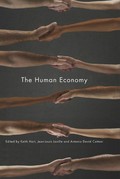The Human Economy

1. Edition October 2010
320 Pages, Softcover
Wiley & Sons Ltd
The global financial crisis has renewed concern about whether capitalist markets are the best way of organizing economic life. Would it not be better if we were to treat the economy as something made and remade by people themselves, rather than as an impersonal machine?
The object of a human economy is the reproduction of human beings and of whatever sustains life in general. Such an economy would express human variety in its local particulars as well as the interests of all humanity.
The editors have assembled here a citizen's guide to building a human economy. This project is not a dream but is part of a collective effort that began a decade ago at the first World Social Forum in Porto Alegre, Brazil, and has gathered pace ever since.
Over thirty original essays address topics that range from globalization, community participation and microcredit to corporate social responsibility and alternative energy. Each offers a critical guide to further reading.
The Human Economy builds on decades of engaged research to bring a new economic vision to general readers and a comprehensive guide for all students of the contemporary world.
Part One: World society.
Globalization (Thomas Hylland Eriksen).
Global public goods (Philip Golub & Jean-Paul Maréchal).
International organizations (François-Xavier Merrien & Angèle Flora Mendy).
Development (Keith Hart & Vishnu Padayachee).
Alter-globalization (Geoffrey Pleyers).
Part Two: Economics with a human face.
Plural economy (Jean-Louis Laville).
Ecological economics (Sabine U O'Hara).
Feminist economics (Julie A Nelson).
Fair trade (Alfonso Cotera Fretel & Humberto Ortiz Roca).
Labour economy (José Luis Coraggio).
Microcredit (Jean-Michel Servet).
Informal economy (Keith Hart).
Part Three: Moral politics.
Citizenship (Paulo Henrique Martins).
Corporate social responsibility (Anne Salmon).
Welfare (Adalbert Evers).
Gift (Alain Caillé).
Moral economy (Chris Hann).
Communism (David Graeber).
Part Four: Beyond market and state.
Third sector (Catherine Alexander).
Solidarity economy (économie solidaire) (Jean-Louis Laville).
Community participation (Marilyn Taylor).
Local development (John M Bryden).
NGOs (David Lewis).
Social capital (Desmond McNeill).
Social enterprise (Jacques Defourny & Marthe Nyssens).
Social entrepreneurship (Lars Hulgård).
Part Five: New directions.
Community & complementary currencies (Jérôme Blanc).
Digital commons (Felix Stalder).
Mobility (John Urry).
Alternative energy (Arnaud Sales and Leandro Raizer).
Worlds of emancipation (Antonio David Cattani).
Contributors.
Index.
Journal of the Royal Anthropological Institute
"With its interdisciplinary and cosmopolitan approach, [The Human Economy] gives a unique introduction into alternative ways of thinking about our economy that are rarely mentioned in public debates...This book should be compulsory reading for social scientists,especially economists."
Museum Anthropology Review
"A fascinating and very useful read for those interested in how to change the present crisis-ridden economic system."
Morning Star
"This book is a treasure trove for everyone trying to bring the common good and democratic political agency back into economics. International in scope, imaginative in spirit, it brings together the diverse experiences and ideas that could make possible a transition to a social, ecological and democratic global economy. It is a rich resource for emancipatory politics."
Hilary Wainwright, Fellow, Transnational Institute, Co-editor, Red Pepper
"For a nanosecond after the current financial collapse that threatens to engulf all, politicians, the media and decision-makers spoke of the need to build a new, humane, and needs-oriented economy. Quickly, analysis returned to how best to regulate capitalist profligacy, and restore old institutions, assuming this will return things to normal. This book, with its rich ideas and diverse examples, exposes the limitations of such thinking and traces the outlines of an alternative economic system with greater promise."
Ash Amin, Durham University
Jean-Louis Laville is Professor of Sociology at the Conservatoire national des arts et métiers.
Antonio David Cattani is Professor of Sociology at the Universidade Federal do Rio Grande do Sul.


